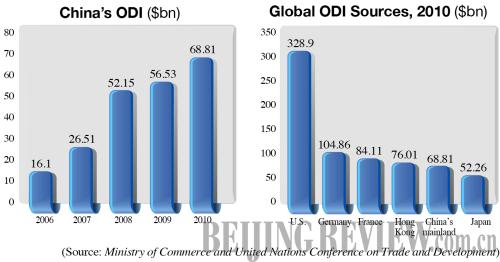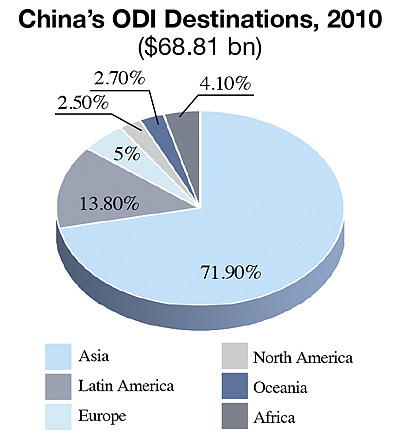|
"It is necessary to improve the credit guarantee system and encourage financial innovations to support firms eyeing abroad, as well as expand insurances to cover their overseas assets and personal safety of employees," said Hou.
Bao Yujun, President of All China Private Enterprises Federation, said a more effective measure is to encourage deep-pocketed private investors to make inroads abroad, and allow them to fairly compete with state-owned counterparts.
"Another formidable barrier is shortage of talents proficient in foreign languages and versed in local cultures, international laws and management expertise," said Kong Linglong, Director of Department of Foreign Capital and Overseas Investment under the National Development and Reform Commission.
In 2007, the Industrial and Commercial Bank of China (ICBC) set up a branch in New York. The bank owned more than 200 overseas branches at the end of 2010.
"A daunting challenge is to build a local team as we tried to localize our branch," said Bi Mingqiang, General Manager of ICBC, New York Branch. "The employees should not only know the local market and become familiar with local clients, but also understand Chinese philosophy and speak Chinese."
Finding these kinds of people is not easy, he said.
For expansion-minded Chinese entrepreneurs, the path of going global may have a number of pitfalls, such as political risks, riots and wars.
The political turmoil in Libya, for example, has extracted a heavy toll on China's 50 contracted projects in the African country worth around $18.8 billion. Worse still, few Chinese companies bought insurance to hedge risks in the turbulent African country.
In July 2008, China's second largest iron ore trader, Sinosteel, made headlines by acquiring assets of the Australian iron ore miner Midwest Corp., including the Weld Range project. But recently, Sinosteel has announced a halt to the project and laid off 43 workers. The company cited setbacks in the progress of the Oakajee Port and rail project as the reason for suspension. It was crucial for the Weld Range project as it was meant to enable efficient transportation of the mined iron ore to market.
Sinosteel said the delays are costing the company $100 million a year, a setback the company simply cannot afford.
"Many failed investments have demonstrated the importance of fully understanding the target market, as well as local legal environment and possible risks," said Xing Houyuan, a senior researcher at the Chinese Academy of International Trade and Economic Cooperation under the MOFCOM.
Indeed, the business of low-cost manufacturing is a world away from cross-border operations. Managerial expertise and cultural sensitivity needed to build a global foothold cannot be achieved overnight. Not to mention the difficulties of managing overseas workforces or dealing with local regulators and unions.
The Chinese electronics maker TCL in 2004 took over the French company Thomson's television manufacturing business and Alcatel's handset unit in 2005 but had to wind down both businesses following spiraling losses. TCL could not anticipate the high integration costs, and boardroom squabbles with its new French executives also drained life out of the venture.
Li Dongsheng, Chairman of TCL, even publicly complained that French colleagues refused to answer his phone calls on weekends while the French executives complained that the Chinese worked too hard and never relaxed.
Tang Min, Deputy Director of the China Development Research Foundation, said organic growth, obtaining a minority stake in the target or simply garnering core technologies are safer choices, which can also provide flexibility and diverse strategic options in the future.
Organic growth enables the company to manage its pace of investment, control risks and receive preferential treatment from local governments appreciative of job creation. In addition, the company can avoid the complexities of integration inhere in M&As, he said.
Some Chinese companies are learning lessons from Sinosteel's and TCL's frustrations to proceed with outgoing forays in a more sophisticated way. The white goods maker Haier, for instance, agreed in August to purchase the household appliance business of the Japanese company Sanyo. Haier said it is bound to benefit from Sanyo's energy-efficient refrigeration technologies and entrenched sales network in Southeast Asia.
"As opposed to expanding blindly, Chinese firms should have a clear strategy of overseas forays, whether it be M&A, greenfield, minority stakes or other forms of collaboration," said Guo Tianyong, Director of the Research Center of China's Banking Industry under the Central University of Finance and Economics.
"It is necessary to build an effective business model tailored to target markets and press ahead with innovations," he said. "Chinese companies are good at adopting new technologies, but they usually fall short in creating new ideas."

 | 